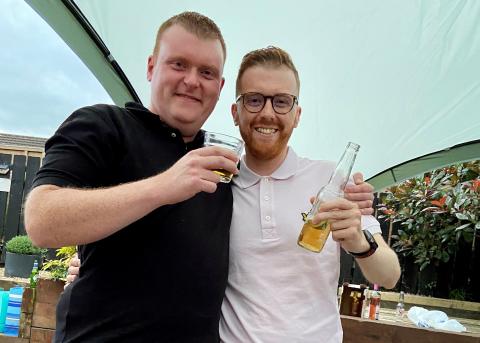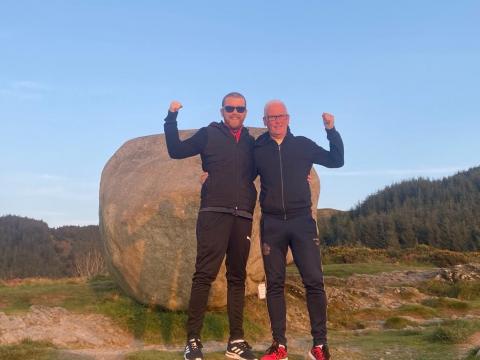Ciarán is from Newry, Northern Ireland, and was told that he needed a stem cell transplant after being diagnosed with Acute Myeloid Leukaemia.
One of ten children, Ciarán’s brother was luckily a match for him and went on to be his stem cell donor. Ciarán received his sibling transplant at Belfast City Hospital and remains on a clinical trial.
Ciarán shares his transplant experience, what got him through it and how he is doing now.
What was it like to be diagnosed with acute myeloid leukaemia (AML)?
The only word is 'shock'. All I can think is how remarkably calm I was with the whole thing. I just thought I had a very bad flu but I went to my doctor who referred me to A&E. They took some blood after I passed out. I was admitted that night and told I had AML.
You were told that you needed a stem cell transplant. So how did that feel, being told what was ahead?
In truth, I didn’t know what it was. My consultant at Belfast City Hospital was very informative of what the process involves. I thought to myself, if this is what needs to be done, then it needs to be done. Acceptance at that stage.
Interestingly, you also joined a clinical trial before your transplant went ahead. Can you tell us a bit about that?
I was eligible for a clinical trial which was to do with treating the AML and I said ‘sign me up’ straightaway. I’ve watched enough American TV shows to know that if you’re offered a clinical trial, you take it.
What did that clinical trial involve for you?
I went through a couple of rounds of chemotherapy, and then attended a course of chemotherapy in the morning and evening and that treatment didn’t actually work. I then ended up in a trial group and had the trial drug. It was crazy-looking purple stuff!
What were your team looking for in terms of monitoring you on the clinical trial?
The trial was going to be a lot more in-depth and detailed than standard treatment, including genome sequencing and enhanced screening. Whenever they were taking my usual blood, the clinical team would take another six vials to send to the clinical trial lab. It does give you a good sense of doing something that can benefit others.
Your family were going to be tested, and your brother was a suitable donor match for you. What was that process like for you and your family?
The process was pretty straightforward for me. When the doctors told us it’s a 25% chance for a sibling match, we thought the outcome may be good here because there are 10 of us!
What was that like waiting for those results and then finding out it was your brother who was suitable?
It was a tense wait. They told my brother first, Daniel, that he was a suitable match when he was on top of a client’s roof installing their TV. He said he nearly fell off the roof when he got the news!
Despite not liking needles, all went OK with his donation. He donated at the Cancer Centre in City Hospital. He was back to normal pretty much after.

Then you were able to have the stem cell transplant at City Hospital because your brother was a donor and the stem cells were on site. How was your transplant?
The transplant itself was relatively uneventful. One thing I’ll always remember is the sensation when the cells were going in. I had a very strange metallic taste in my mouth.
How was your time in hospital and the isolation period?
The time in hospital was pretty tough because I was in a room by myself. Visitors weren’t allowed due to COVID. That was probably the toughest part because my family are very close.
During it all, I was quite heavily medicated and wasn’t actually able to make phone calls at times. There were some video calls when I felt able to, and it was good to see faces.
Did you get a lot of support from your healthcare team?
There’s a multi-disciplinary team, the staff from 10 North in Belfast City Hospital, they’re absolute heroes in my mind. I got great support. It’s humbling, how much you actually realise that people care whenever you’re in a situation like that. You trust these people with your life, and rightly so, because they’re a cut above, really.
How was your recovery?
Long. I spent six to eight weeks in hospital and spent my 30th birthday there, which was a bit crap.
Not how you probably pictured turning 30!
No, definitely not. I eventually got home and it was like stepping into a different world. It was bizarre because the whole time I’d been in the hospital the pandemic had been kicking off, and I didn’t really experience much of it. I did experience all the protocols, obviously, in the hospital but, it was a strange experience coming out.
What was helpful within your recovery?
The support of my girlfriend Claire. I’ll never know how or where she got the strength to help me through. My family too. I moved back to my parents’ house for the recovery because I knew it would be too hard to do it alone. The one thing I’ve learnt is having a good support network around you really does make a difference. It wasn’t the worst thing in the world having your mum do everything for you again as well!
I stuck to most of the advice that I had been given but anybody who knows me knows I’m quite a stubborn person. I decided I’ve got one thing in mind that I want to do and that was climbing the mountain in Kilbroney. I didn’t bother telling my mum or anything because I knew she’d be dead set against it. We eventually got up it and that was a major turning point for me.
How is your physical health now?
They had a static exercise bike in hospital which I used to keep moving. I decided that I’d get a road bike and I’ve been out cycling ever since. It’s actually enjoyable. I did a charity cycle recently which is over 300 miles in the month of May. A year after the transplant, I was able to just about make the distance. I’m very proud of that.
Do you have any advice for any other patients who are going through a stem cell transplant in Northern Ireland?
What is important is hope. You have to never lose sight of what’s in front of you.
I know it was very difficult, even for myself, to get into a positive mindset. It helps to have something to work towards. I thought to myself, I’m too young for something like this to affect my life that much.
Also, if you surround yourself with strong people, you can gain strength from their strength. Having your support network there and mirroring your positivity and passing all that to you. Same goes for when in hospital – just mention anything to your doctors, nurses, your healthcare team. Don’t let things spiral.
How are you doing at the minute?
It’s just over a year since I was discharged. I’m finishing my phased return to work and soon I’ll be back full time. I still have some after-effects of the transplant. My hands get sore in the mornings. My feet get sore. So, I’m wearing quite padded trainers in work instead of the usual office shoes. But these are minor things compared to what we were facing 18 months ago. I feel like I’m fitter than I’ve ever actually been.
I am still in full remission. There’s no sign of any residual disease. The next thing is to get into a more stable financial situation and hopefully my partner and I will be looking to buying a house within the next few months. Everything at the minute for me is really looking up.
- You can call our helpline on 0303 303 0303 for stem cell transplant information and advice, or email us at patientinfo@anthonynolan.org
- We have further stem cell transplant info and support in our Patients & Families section.
